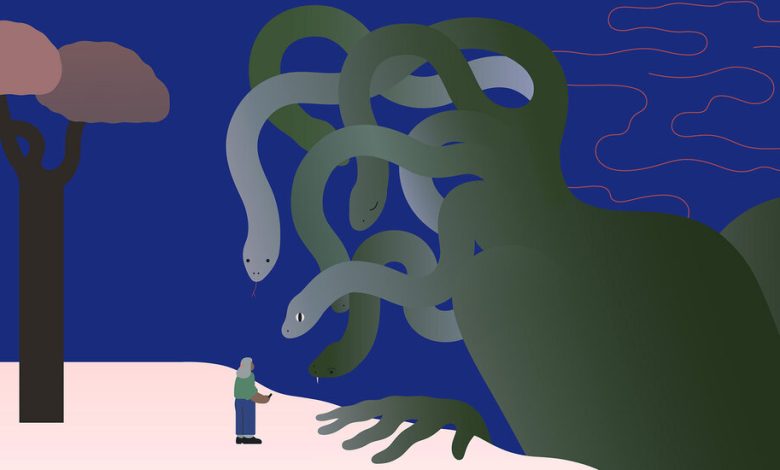The War Orphan and the Warmongering Alien

EXORDIA (Tordotcom, 532 pp., $29.99) is Seth Dickinson’s fourth novel and first work of science fiction, following three installments of the excellent Baru Cormorant fantasy series, and it revisits many of those novels’ themes and structures: empire, war and sacrifice.
Set in 2013, “Exordia” is a first-contact story: Anna, a Kurdish survivor of genocide who is fostered in the United States, meets a many-headed snake alien named Ssrin in Central Park. Anna and Ssrin become friends and roommates; Ssrin explains that she comes from a galaxy-conquering empire called the Exordia, and needs Anna’s help to rebel against it.
Anna, Dickinson writes, “is all in, the way only a woman chased out of her home by sarin gas can be all in. Her adult life began at age 7, with an act of alien intrusion, with the roar of Saddam’s helicopters. This is nothing new to her. She’s ready to risk it all, because no part of her life since that first alien invasion has felt real.”
There is a version of this book that might be more palatable to a broad readership: a version in which a traumatized war orphan’s friendship with a warmongering alien heals and redeems them both. This is very decisively not that book. It deliberately withholds what its first three chapters (and dust jacket) seem to promise: a “narratively complete” story centering Anna and Ssrin. Instead, “Exordia” compounds, enlarges and repeats their wounds — the ones inflicted on them, and the ones they inflict on the world and each other — as Dickinson uses a host of other characters to scrutinize ethics, fractal mathematics, theoretical physics and the military-industrial complexes of several nations. The result is agonizing and mesmerizing, a devastating and extraordinary achievement, as well as dizzyingly unsatisfying, given where it ends.
The publisher of “Exordia” claims it is a stand-alone novel. This is baffling. If you stop a play after its first act, it does not become a one-act play. “Exordia” is structured and paced like Book 1 of a series; Dickinson has stated in interviews that a sequel is “absolutely” intended. The word “Exordia” itself — the plural of “exordium” — suggests beginnings and introductions, a throat-clearing before the main work, and I sincerely hope Dickinson gets the opportunity to continue it.




